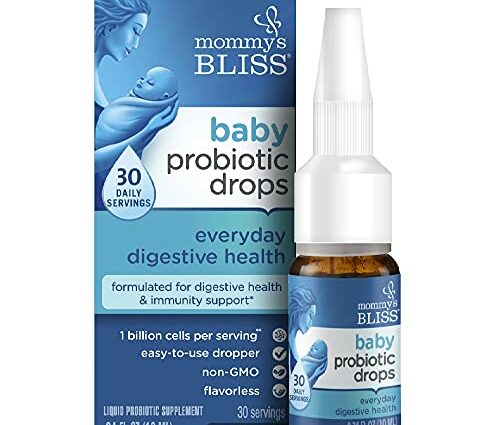Contents
Baby probiotics: good or bad use
Probiotics are living bacteria that are good for the intestinal microbiota and therefore for health. In which cases are they indicated in babies and children? Are they safe? Response elements.
What are probiotics?
Probiotics are live bacteria found in different types of products:
- Food ;
- medication ;
- food supplements.
Lactobacillus and Bifidobacterium species are the most used as probiotics. But there are others such as the yeast Saccharomyces cerevisiae and some species of E. coli and Bacillus. These live bacteria can have a beneficial effect on health by colonizing the colon and maintaining the balance of the intestinal flora. This is home to billions of microorganisms and plays a role in digestive, metabolic, immune and neurological functions.
The action of probiotics depends on their strain.
Where are probiotics found?
Probiotics are found as supplements (available at pharmacies) in liquids or capsules. It is also found in some foods. Food sources rich in natural probiotics are:
- yoghurts and fermented milks;
- fermented drinks such as kefir or even kombucha;
- beer yeast ;
- sourdough bread;
- pickles;
- raw sauerkraut;
- blue cheeses such as blue cheese, roquefort and those with a rind (camembert, brie, etc.);
- le miso.
Some infant milk are also fortified with probiotics.
When to supplement a child with probiotics?
In a healthy infant and child, probiotic supplementation is not necessary because their gut microbiota already contains all the good bacteria necessary for their proper functioning. On the other hand, certain factors can unbalance the intestinal flora in the baby and weaken his health:
- taking antibiotics;
- a change in diet;
- weakened immune system;
- gastroenteritis;
- diarrhea.
Probiotic supplementation may then be advised to restore balance. In a report published on December 3, 2012 and updated on June 18, 2019, the Canadian Pediatric Society (CPS) compiled and reported on scientific studies on the use of probiotics in children. Here are his conclusions.
Prevent diarrhea
DBS distinguishes diarrhea associated with taking antibiotics from diarrhea of infectious origin. To prevent diarrhea associated with antibiotics, Lactobacillus rhamnosus GG (LGG) and Saccharomyces boulardii would be the most effective. Regarding the prevention of infectious diarrhea, LGG, S. boulardii, Bifidobacterium bifidum, Bifidobacterium lactis and Lactobacillus reuteri would reduce the incidence in non-breastfed infants. A combination of Bifidobacterium breve and Streptococcus thermophilus would prevent dehydration caused by diarrhea.
Treat acute infectious diarrhea
Probiotics may be indicated to treat acute viral diarrhea in children. In particular, they would reduce the duration of diarrhea. The most effective strain would be LGG. The CPS specifies that “their effectiveness depends on the strain and the dose” and that “the beneficial effects of probiotics seem more evident when the treatment is initiated quickly (within 48 hours)”.
Treat infantile colic
The composition of the intestinal microbiota is believed to be linked to the occurrence of colic in babies. Indeed, children prone to colic have a microbiota less rich in lactobacilli than others. Two studies have shown that L reuteri significantly reduces crying in infants with colic. On the other hand, probiotics have not proven their effectiveness in the treatment of infantile colic.
Prevent infections
By boosting the immune system and gut permeability to pathogenic bacteria, probiotics may help reduce recurrent respiratory illnesses, otitis media and taking antibiotics to treat them. Probiotics that have been shown to be effective in several studies are:
Prevent atopic and allergic diseases
Children with atopic dermatitis have an intestinal microbiota that is less rich in lactobacilli and bifidobacteria than other children. However, recent studies have not been able to demonstrate the beneficial effects of lactobacilli supplementation in preventing allergic disease or hypersensitivity to foods in children.
Treat atopic dermatitis
Three large studies concluded that probiotic treatment did not have significant results on eczema and atopic dermatitis in children.
Treating irritable bowel syndrome
Several studies have shown that Lactobacillus rhamnosus GG and Escherichia coli strains help reduce symptoms of irritable bowel syndrome. But these results need to be confirmed with further studies.
Can probiotics be harmful to children?
Consuming natural probiotics (found in food) is safe for children. For supplements fortified with probiotics, it is best to seek the advice of a doctor before giving them to your child as they are contraindicated in children with an immune system weakened by disease or medication.
Regarding their effectiveness, it depends on both the strain and the disease to be treated. “But whatever probiotic you use, you have to administer the right amount,” concludes the CPS. For example, proven supplements typically contained at least two billion bacteria per capsule or dose of liquid supplement.










